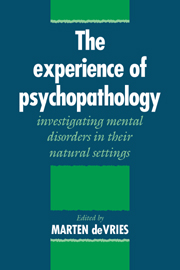Book contents
- Frontmatter
- Contents
- Foreword
- Preface
- PART I INTRODUCTION: THE EXPERIENCE OF PSYCHOPATHOLOGY
- PART II THE EXPERIENCE SAMPLING METHOD: PROCEDURES AND ANALYSES
- PART III EXPERIENCE SAMPLING STUDIES WITH CLINICAL SAMPLES
- PART IV THERAPEUTIC APPLICATIONS OF THE EXPERIENCE SAMPLING METHOD
- 20 The uses of the ESM in psychotherapy
- 21 Expanding the experiential parameters of cognitive therapy
- 22 The monitoring of optimal experience: a tool for psychiatric rehabilitation
- 23 The ESM and the measurement of clinical change: a case of anxiety disorder
- 24 The applicability of ESM in personalized rehabilitation
- 25 Everyday self-awareness: implications for self-esteem, depression and resistance to therapy
- PART V PSYCHIATRIC RESEARCH APPLICATIONS: PRACTICAL ISSUES and ATTENTION POINTS
- CLOSING Looking to the future
- References
- List of contributors
- Index
25 - Everyday self-awareness: implications for self-esteem, depression and resistance to therapy
from PART IV - THERAPEUTIC APPLICATIONS OF THE EXPERIENCE SAMPLING METHOD
Published online by Cambridge University Press: 03 May 2010
- Frontmatter
- Contents
- Foreword
- Preface
- PART I INTRODUCTION: THE EXPERIENCE OF PSYCHOPATHOLOGY
- PART II THE EXPERIENCE SAMPLING METHOD: PROCEDURES AND ANALYSES
- PART III EXPERIENCE SAMPLING STUDIES WITH CLINICAL SAMPLES
- PART IV THERAPEUTIC APPLICATIONS OF THE EXPERIENCE SAMPLING METHOD
- 20 The uses of the ESM in psychotherapy
- 21 Expanding the experiential parameters of cognitive therapy
- 22 The monitoring of optimal experience: a tool for psychiatric rehabilitation
- 23 The ESM and the measurement of clinical change: a case of anxiety disorder
- 24 The applicability of ESM in personalized rehabilitation
- 25 Everyday self-awareness: implications for self-esteem, depression and resistance to therapy
- PART V PSYCHIATRIC RESEARCH APPLICATIONS: PRACTICAL ISSUES and ATTENTION POINTS
- CLOSING Looking to the future
- References
- List of contributors
- Index
Summary
The significance of self-awareness to the therapeutic process has long been recognized by psychiatrists and clinical psychologists. Freudian psychoanalysis encourages the conscious exploration of one's emotional and behavioral responses to facilitate the resolution of an emotional conflict. In Kohut's (1971) self-psychology, the focus is even more specifically on the individual's inner experience of relations between self and others (Wolf, 1987). Client-centered therapists (Rogers, 1961; Gendlin, 1973), although espousing a very different theoretical orientation, also encourage their clients to focus directly on and explore their personal experience in order to actualize their full potential as human beings. Similarly, cognitive therapies (Beck, 1976; Ellis, 1973) direct clients' attention to their maladaptive ways of thinking about themselves and their interpersonal interactions. Even behaviorists, dissatisfied with the focus on mental and emotional content (Skinner, 1953; Wolpe, 1958; 1969), will direct their clients' attention to observable behavioral symptoms and the development of more functional and desirable behavior.
Whatever the clinician's particular bias, the nature of psychotherapy is such that the person is required to attend to the self, whether the focus is on one's emotional experience, cognitive processes, or behavioral patterns. It would be ludicrous to suggest that the client could participate effectively in the therapeutic process without paying attention to the self. Yet while self-awareness is generally understood to be a fundamental element of psychotherapy, relatively little consideration has been given by clinicians to the direct effects of this basic cognitive operation.
- Type
- Chapter
- Information
- The Experience of PsychopathologyInvestigating Mental Disorders in their Natural Settings, pp. 304 - 314Publisher: Cambridge University PressPrint publication year: 1992



